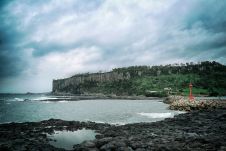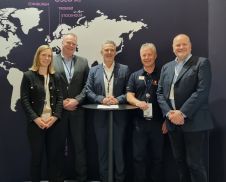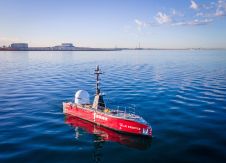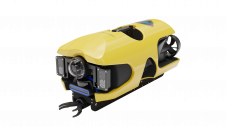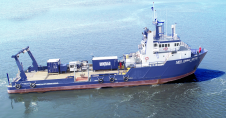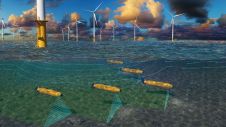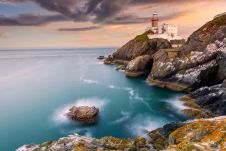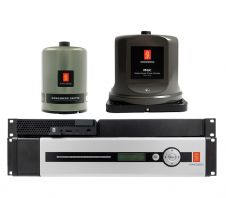Invited Reply
Job Satisfaction?
Working conditions in offshore surveying are sometimes pretty tough and demanding. Nevertheless, some hydrographic surveyors remain in the field until their retirement. Others leave the scene after a couple of years. The number of students attending certain educational institutes to train for this work is declining to an unacceptably minimal level. Hydro international was interested in investigating the motivation of hydrographic surveyors, their work attitude, job-satisfaction, etc. and interviewed three categories on the matter: students, surveyors and retired surveyors.
Question to students
What is your motivation in becoming a hydrographic surveyor, where and what do you study and what do you expect from your future in general and the job of hydrographic surveyor in particular?
Maree Tomlinson, Hydrographic Surveying Student, University of Otago, Dunedin, New Zealand
Surveying ignites my imagination. I begin to think of great explorers É Kupe leading his people across the Pacific, navigating using the stars, to find Aotearoa. Captain Cook sailing halfway around the world to map New Zealand. I hear the call of the sea and want to discover my world like the other great explorers. Hydrographic surveying offers endless possibilities.
The principles and values I uphold are universal equality, co-operative problem-solving and peaceful interaction with nature, with one another and with other species. It is imperative we use these principles to manage our most important resource, our oceans. Hydrographic surveyors will become more involved in resource management and will no longer be restricted to working at sea. As we begin to realise the significance of our role, more women will become involved in offshore management. Land-based management roles will allow women to combine family life with work.
I have had many mentors who have shown me I can carve my own career. These role models taught me how to survive in a male-dominated environment and encouraged me to fulfil my dreams. I want to inspire other women to achieve their own dreams and know anything is possible. My advice is "Live your life out loud." You never know what will ignite a girl’s imagination and let her know she too can achieve.
Biography
Maree Tomlinson is in her final year of academic study at the University of Otago, Dunedin, New Zealand. She aims to become a Category A Hydrographic Surveyor and can be contacted at [email protected].
Ayodeji Olugbode, Lieutenant Commander of the Nigerian Navy, studying for a Bachelor of Science degree in Hydrography at the University of Plymouth, United Kingdom
My primary motivation for pursuing hydrography as a profession was informed by the versatility of hydrographic surveying, both within and outside of a military career. Furthermore, the realisation that hydrography has evolved to become an essential tool for nation building, especially for littoral nations, has provided me with additional conviction in being a hydrographic surveyor.
Recently, there has being an increase in co-operation amongst governmental hydrographic stakeholders in Nigeria. This could not have come at a better time, when the International Hydrographic Organisation (IHO) is poised to improve capacity building around the Gulf of Guinea. These developments give a feeling of optimism that the future for hydrography in Nigeria is bright. Additionally, I reckon that the New Economic Partnership For Development in Africa (NEPAD) could also provide a suitable pedestal for capacity building.
Armed with adequate knowledge and exposure from my studies, I expect to return to Nigeria and contribute my quota in taking hydrography to the pinnacle of recognition in nation building and among other African littoral states in general. As a prelude to addressing hydrographic capacity building, the development of adequate human resources would be my primary focus.
Question to Surveyors
Why did you become a hydrographic surveyor, what is your educational background, are you satisfied with your career in general and how do you see your future?
Chris Gray, English nationality and at present Hydrographic Surveyor with D.O.O.R. bv, The Netherlands
Along with many other people, my career development has been somewhat haphazard, owing little to any overall strategic plan. Circumstances took me to Abu Dhabi in 1980 as a Drawing Office Manager and fairly quickly it seemed to me the carefree life (and increased remuneration) of the offshore surveyor was infinitely preferable to the drudgery of the drawing office. After several years of on-the-job training on various anchor tugs and lay barges, I returned to UK to formalise my education at Plymouth. I flirted briefly with real respectability when I completed my TPC, but never followed it up by seeking full membership of the RICS.
Am I satisfied with my career? I suppose the honest answer would be ‘vaguely dissatisfied’. But in truth the industry has provided my family and myself with a very reasonable lifestyle. The cut-and-thrust of offshore construction still gets my juices flowing on occasions and I enjoy the intense way of working when you are offshore. The thought of returning to a more mundane 9-to-5 existence, complete with the joys of ‘office politics’, holds little interest for me. Can people actually live with only 3 weeks annual leave a year? I think I will stick with my 26 weeks - thank you.
How do I see my future? I suspect that in a few more years, when I can no longer ‘hack it’ as a Party Chief, I will move into the more gentle existence of ‘Company Man’. Will I stop working offshore? I very much doubt it; in all honesty, I can’t afford to. Would I stop working offshore if I won the lottery?…yes!
Biography
Chris Gray has a BSc (Hons) in Geography and a DipHS in Hydrographic Surveying (Plymouth). He has also he earned an RICS/MST Test of Professional Competence.
Luis Salgado, President Desmar Ltd., Chile
I decided to be a hydrographic surveyor when I was 19 years old. At that time, as sub-lieutenant, I was serving on board a Chilean Navy patrol boat operating in the waters surrounding Cape Horn. I was the navigator and working with charts was one of my main occupations, both to prepare tracks and conducting navigation. Along with this, and due to the sparse information contained in the charts of the area (Beagle Channel, Cape Horn, Ponsomby Sound, Cook Bay, Whaler’s Channel and other unexplored features), surveying to access sounds or sailing through narrow passages was very common to me. These surveys were conducted with lead lines, radar distances and compass bearings. Perfecting the coastlines on the charts with the help of radar was also a common duty. The more I studied methods to achieve my goals as navigator and ‘appointed’ surveyor, the more I got fascinated with hydrographic surveying.
Soon I realised that the task of re-surveying charts with old and incomplete data, as well as surveying to compile new charts of unexplored water, was a huge endeavour and one in which I would find great professional challenges. So when choosing a speciality three years after my first contact with hydrography, I had no doubt in my mind.
In December 1980 I graduated as Hydrographic Engineer from the Chilean Navy«s Polytechnic Academy. Twenty-four years have passed since then and every time I ask myself if I made a good decision when choosing to be hydrographer, the answer is always the same: yes.
I retired from the Chilean Navy six years ago and started my own surveying company (Desmar). My education as hydrographic surveyor and the experience accumulated through years have greatly helped me in succeeding as a private consultant. I love this profession!!
Biography
Luis Salgado graduated as Navy Officer from the Chilean Naval Academy in 1976 and four years later graduated as Hydrographic Surveyor from the Chilean Navy’s Polytechnic Academy. In 1992 he graduated as Master of Science in Geodetic Sciences from Ohio State University, USA Currently Mr Salgado is President of Desarrollo Marítimo, Servicios y Equipamiento Limitada (Desmar Ltd.) in Chile.
Question to Retired Surveyors
For what reason did you become a hydrographic surveyor and which route did you take in training? Has your career given you full satisfaction and fulfilled your expectations? Given the opportunity, would you do it again?
Dirk Bakker, hydrographic surveyor, retired from the Rijkswaterstaat, The Netherlands
After completing studies in Holland, my formative interest in hydrography began in California in the mid-1960s with work on various mapping projects along the US West Coast which included small-boat surveys and large triangulation operations using then state-of-the-art angle and EDM systems.
An abiding interest in new technology grew further when I joined the Rijkswaterstaat in 1970, soon becoming involved in surveys for RotterdamÕs harbour entrance and entrance channels in readiness for the arrival of VLCCs with increasing draught.
This and other activities in the North Sea involved research and application of new survey methods such as underwater sonar and remote sensing, at a time of increasing automation. Later work on testing and introduction of Rijkswaterstaat’s first multi-beam system in collaboration with scientific institutes was a particularly challenging task. And as Secretary of the Nether-lands Hydrographic Institute for several years, co-operation between the national Hydrographic Office and the Rijkswaterstaat, provided rewarding insights into the working of other professional bodies.
Have the challenges and diversity of hydrography fulfilled expectation, and would I return to them? Yes, most definitely!
Biography
Dirk J. Bakker retired from the Rijks-waterstaat North Sea Directorate in September 2002, having been associated with the organisation for over 30 years. He originally studied land surveying and photogrammetry before developing a long-term interest in hydrography, later serving on several national and international geodetic and hydrographic commissions. An Emeritus Member of the Hydrographic Society, he recently acted as advisor to the Dutch Ocean Group, organisers of the Netherlands pavilion at Oceanology International 2004 in London.
Tom McCulloch, retired from the Canadian Hydrographic Service
I would probably not have become a hydrographic surveyor if Canada's deep-sea fleet had remained a viable entity.
Along with others of my background I was accepted into the CHS as a hydrographer in training. Most of my training was on the job, with additional technical training provided at technical institutes. My field assignments were originally on the Pacific Coast, prior to being selected to head up the Western Arctic Survey. I enjoyed the work and its challenges but having a growing family, sought further promotion. That reward finally arrived when I became a ‘desk wallah’, directing operations and developing policy.
I was fortunate in being involved in hydrography in a period of expansion, when technology was undergoing rapid change and new techniques were being developed. In this period the CHS moved from relative obscurity to recognition as a leader in worldwide hydrography.
I would do it all over again if presented with the same set of circumstances. When I look at the present situation in Canada, with severe cuts in funding affecting both public and private sector, I feel compassion for a talented group and contempt for their political masters.
Biography
Tom McCulloch is a Master Mariner Foreign Going, who joined CHS Pacific in 1953. He served as a Hydro-grapher in Charge Canadian Western Arctic from 1958 to 1967 and as a Regional Hydrographer Central from 1968 to 1972. Mr McCulloch also served as Director Marine Sciences Central from 1973 to 1977 and as Director General Bayfield Laboratory from 1978 to 1985. Later on, he
became Manager of Hydrographic Training Jamaica & Malaysia and gained international recognition for Malaysia-based courses in 2001. Following this success Mr McCulloch was awarded the prestigious Honorary Member Institution Surveyors Malaysia. Tom McCulloch is the author of Mandalay to Norseman - seafaring memories, and is presently writing a sequel depicting his hydrographic experience.

Value staying current with hydrography?
Stay on the map with our expertly curated newsletters.
We provide educational insights, industry updates, and inspiring stories from the world of hydrography to help you learn, grow, and navigate your field with confidence. Don't miss out - subscribe today and ensure you're always informed, educated, and inspired by the latest in hydrographic technology and research.
Choose your newsletter(s)












